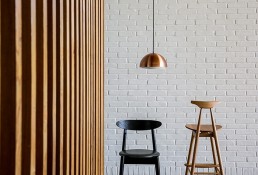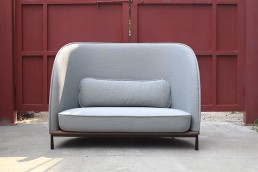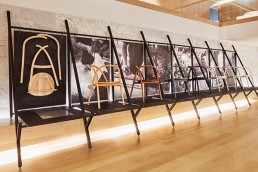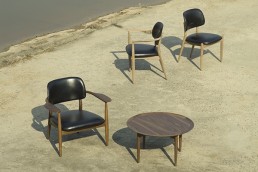FEATURE: Stellar Works
In quest of becoming a truly international brand, Stellar Works continues to bridge the gap between East and West, fusing Asian sensibility and timeless craft.
Since its inception in 2012, Shanghai-based furniture brand Stellar Works has subverted the notion that China is merely home to mass-volume production, carefully balancing heritage and modernity through its specialised atelier that preserves traditional craft techniques and handmade detailing while pushing the boundaries of design.
For the company’s founder and CEO, Nagoya-born designer Yuichiro Hori, Shanghai is an operational base and source of continuous growth: “It’s still affordable to follow a design-led craft process in Shanghai, while it would be impossible in Japan, the Americas or in Europe,” he says. “The city is a hospitality-oriented market where quality standards are higher than in Mainland China.”
Hori first arrived in Shanghai in 1998, working as a project manager for a Japanese developer before setting up his own practice with luxury French manufacturer Laval after investing in a local factory. With the aim of inspiring a renaissance in Asian aesthetics, he channelled the forms, styles and motifs that had characterised Japanese design across the centuries through a European lens. The cross-cultural ethos began with the company’s logo; designed as a Japanese crest and developed by Kyoto-based typographist Shimada, it combines the soft curves of the Piano Chair by Danish architect Vilhelm Wohlert with a base symbolising an open mindset with a strong belief in innovation through tradition.

The fusion of East and West didn’t stop there, with Chinese craftsmanship and Nordic aesthetics setting the tone for Stellar Works ever since. With Asian and Scandinavian cultures sharing many of the same values when it comes to materials, design, nature and craft, Hori was keen to ensure both were key elements of the brand DNA: “The bringing together of cultures is what sets us apart, both in terms of the character of our creative output and the strength of our business today,” he explains. “It’s important to see things from different perspectives, as it brings a sense of discovery to our brand and our products.”
Having married the dynamism of Japanese operations management, the high-end craftsmanship of French furniture-making and the technical proficiency of its Shanghai production team, Hori decided to introduce a fourth collaborative party. In 2015, he brought in Lyndon Neri and Rossana Hu, founders of Chinese design studio Neri & Hu, to oversee the creative process of everything from product development to photo shoots. “Stellar Works is a brand that originates from Asia but faces the globalised world with sensibilities and an aesthetic philosophy that is very close to that of Neri & Hu,” says Hu. “We embrace similar values such as a sincere respect for tradition and craft, while looking towards the future for new breakthroughs in design through technology and critical thinking.”
The brand’s collaborative approach has gone from strength to strength, with interior architects and designers becoming the creative heart of its vision. Partnering with Yabu Pushelberg, Space Copenhagen, David Rockwell, Nic Graham and Crème Design has led to a plethora of contemporary lines, from the distinctly Nordic Rén tables and chairs to the light and playful Blink sofas, while iconic collections from the likes of Jens Risom have also been re-instated for today’s market. At this year’s Stockholm Furniture & Light Fair, Stellar Works partnered with its Scandinavian distributor Roam to present the Arc sofa by Norwegian designer Hallgeir Homstvedt, while Neri & Hu showcased the Industry collection alongside an installation that took cues from the street life of a traditional Chinese village, using a sinuous alleyway layout to create lanes and layers of space that slowly revealed themselves to visitors. Meanwhile in Copenhagen, past and present were brought together once again in the form of vintage chairs by Danish architect Vilhelm Wohlert, which were re-introduced as part of a cross-aesthetic exhibition at the Louisiana Museum of Modern Art.
“We have chosen this path between the old and the new because we believe good design is timeless design, and Stellar Works aims to be timeless,” Hori continues. “We’re not necessarily looking for established or well-known designers, but rather someone who understands and shares our design values.”

Without exception, those collaborating with Stellar Works must have an instinctive understanding of its mission, as well as a talent for combining creative inspiration and craft technique from multiple places and periods of time. The sense of collaboration was key for American designer David Rockwell, who greatly valued working with a bilingual production team when creating the Valet furniture collection in China, while for Danish studio Space Copenhagen, the “immediate connection and mutual understanding” between both parties played an integral role in the creation of its Slow, Rén and Lunar ranges, each of which weaves together elements of Asian design and Scandinavian heritage with contemporary aesthetics.
With around 50% of its projects being hotels, the hospitality industry is a key market for Stellar Works. “Hospitality is a starting point for our business,” Hori confirms. “We are a professional FF&E player in the hospitality sector, as well as a branded furniture company for the residential market.” As a result, every project in their portfolio – from Radisson Collection Royal Copenhagen, Mandarin Oriental Dubai and The Shanghai Edition, to Rosewood Phnom Penh, Four Seasons Kuwait and the recently completed Radisson Blu Edwardian in Manchester – neatly co-ordinates with the brand’s overarching philosophy of Asian sensibility and timeless craft, with collections hand-selected for each individual scheme under the guidance of Neri & Hu.
Up next for Stellar Works is Salone del Mobile in Milan, where it will indicate its ambition to expand with the launch of Lucent, a new lighting collection by OEO Studio, alongside furniture pieces by Australian designer Tom Fereday and Neri & Hu themselves. “In six years we have experienced rapid growth both in terms of our market and product portfolio,” Hori notes. “Over the last 12 months, we’ve set up regional platforms in Europe, North America, Japan and Australia, expanding our business globally from Asia to the world.”
The dream of becoming a truly international furniture brand is edging ever closer, but for Hori, the focus remains on manufacturing quality products that stand the test of time: “I would like to think that 100 years from now, our pieces will still be as contemporary and resonant as they are today and, moreover, that Stellar Works will still be crafting quality furniture that is Asian in inspiration, cross-cultural in design and international in its scope.”
Words: Ben Thomas
This piece originally ran in Sleeper 83
Related Posts
14 September 2018
Stellar Works launches Arc sofa
26 September 2017
Stellar Works on show at Design Museum
10 May 2017




